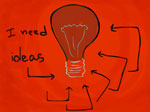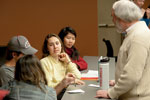| |
|
|

|
|
ATLAS |
|
|
Assistive
Technology
Laboratory
at
Stanford |
|
|
|
Technology
and design benefitting individuals with disabilities and older adults in the
local community |
August 3, 2017 |
|
|
|
|

Perspectives is the newsletter of the
Stanford course,
Perspectives in Assistive
Technology.
Special Issue Soliciting
Student Project Suggestions - Part 3
|
Perspectives in Assistive Technology is a Winter
Quarter Stanford course - now anticipating its twelfth year - that
explores the design, development, and use of assistive technology that benefits
people with disabilities and older adults. It consists of semi-weekly classroom
discussions; lectures by notable professionals, clinicians, and
assistive technology users; tours of local medical, clinical, and
engineering facilities; student project presentations and demonstrations; an
assistive technology faire; and a film screening. Organization of
the coming year's course is underway, with the first class session in
January. |
What are the project
requirements? Previous newsletters described the
benefits of and process for submitting a student
project suggestion and addressed the broad
requirements of those projects. This issue focuses on how best to compose a
suggestion. 
How should project suggestions
be formatted? Compose (text format is ok) and email the project
suggestion(s) for review. Note that both the problem and features of a solution
should be highlighted, but not how a device should appear, be
built, or solve the problem as those are tasks for the student team to address.
To best convey a project suggestion, use last
year's team candidate project list as a guide and format the problem
description into these short, concise paragraphs:
-
Name: - suggest a
simple, short, descriptive phrase or title to refer to the
project.
-
Background: - give
an overview of the organization and / or provide a general description of the
population addressed by the project suggestion.
-
Problem: - briefly
and concisely describe the problem, including how it affects the particular
person with a disability or older adult. (The
Everyday Usefulness of the Problem Statement by Alan Nicol is a
well-written reference article.)
-
Aim: - describe
what the proposed solution should do, but not how
it should do it.
-
Design Criteria: -
list the desirable operational features and characteristics of the proposed
solution. Priortize the criteria into those that are essential, those that
would be good to include, and those of lesser importance.
-
Other: - include
additional information that will illuminate the problem and facilitate a
solution, such as photographs, short videos, a list available resources,
weblinks, and general design suggestions.
-
Contact
Information: - provide the suggestor's name, company (if applicable), email
address, and phone number (optional).
This course relies on community involvement,
so please suggest
a project based upon an identified problem or
challenge.
What is the
deadline for submitting project suggestions? - Please email
suggestions to me as soon as possible so I have adequate time to consider all
submissions, edit approved entries, and post them - not later than Friday,
December 1st.
Upcoming Local
Event

Presentation at Avenidas
Please
plan to attend my upcoming presentation at Avenidas where I will be speaking about the
critical role that older adults and people with disabilities play as they work
with teams of Stanford students to design and fabricate prototype devices that
address real problems and challenges, as well as soliciting project suggestions
for teams to pursue in the course.
- When:
Friday, August 4th from 11:00am to 12:30pm
- Where:
Avenidas, 450 Bryant Street - just off of University Avenue in downtown Palo
Alto
- How: No
RSVP is required to attend this free presentation.
|
|
Support the course - Funding in
any amount for the course and student projects is always welcomed. Monetary
gifts support approved project expenses, administrative costs, honoraria for
guest lecturers, and the end-of-term celebration. Refer to the
Team Project Support webpage for more
information.
Email questions, comments, or
suggestions - Please email
me if you have general questions, comments, or suggestions regarding the
course. Thank you again for your interest.
Dave
|

To unsubscribe from this newsletter, please email
Dave. |
|





